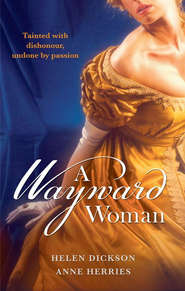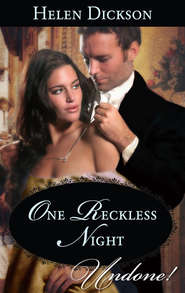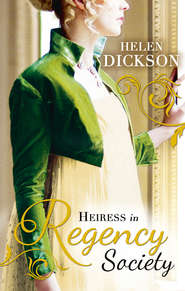По всем вопросам обращайтесь на: info@litportal.ru
(©) 2003-2024.
✖
Reunited At The King's Court
Автор
Год написания книги
2019
Настройки чтения
Размер шрифта
Высота строк
Поля
Furious by what she considered to be Arlette’s insolence, Hester was unable to curb her tongue as it began to run away with her, which was something she would come to regret later. ‘You ungrateful girl. You put me in mind of your mother. You are turning out to be just like her after all. Her ingratitude, after all our father did for her, was unforgivable also.’
Arlette stared at her in puzzlement. ‘My mother? Why do you mention my mother? And why should she have need to be grateful to our father?’
‘Our father was a fool ever to marry her.’
‘Please don’t say that, Hester. I will not let you shake my kinder memories of my mother. She was my mother and I loved her dearly.’
‘How could you? You scarcely remember her.’
‘I was a mere child when she died—I know that. I know very little of how she came to wed our father.’
‘Then it’s high time you did,’ Hester replied sharply. ‘It’s high time you knew what kind of woman she was.’ Anger had brought blood rushing to her face and a hard glitter to her eyes. She looked so frighteningly angry that Arlette almost turned and fled the room. Suspecting that her sister was about to enlighten her to the more disagreeable traits to her mother’s character she turned away, unwilling to hear anything to discredit her.
‘Pray excuse me, Hester, but I will not stay and listen to anything you might say that is disparaging.’
‘Oh, yes, Arlette, you will listen.’
She had always sensed Hester’s deep dislike of her mother, whose name was never mentioned between them. The reason for this dislike had always remained a mystery to her, but she felt it must be something deep and profound, that maybe it was because their father had taken another wife after the death of Hester’s own mother.
‘So our father would have you believe that she died giving birth to our sister in an attempt to hide the truth. She did not care for our father. The man she loved—whose bed she had wallowed in and whose child she had conceived while Father was away in London about the King’s business—was a widower.’
Arlette was filled with an overriding horror at what Hester was telling her. The whole of her world seemed to be rocking about her. It could not be true. ‘But—but that cannot be—she would not...’
‘Yes, Arlette, she did. Open your eyes to the truth. Like a fool Father worshipped her—she could do no wrong in his eyes—but when he returned home after a long absence and found her nursing a child and knowing it could not possibly be his, he turned both her and her child out.’
Arlette stared at her, sick with horror at what she had been told. Feeling light-headed, she slumped into a chair at the table, staring ahead of her, but seeing nothing. There was a constriction in her throat and tears swam in her eyes. ‘What happened to her? Where did she go?’
‘As to that I cannot say. I do not know.’
‘And my sister?’
She shrugged. ‘I don’t know that, either.’
‘What was my sister’s name?’
‘I don’t remember. Miranda—Matilda—something like that. What does it matter now? She was your sister, not mine.’
‘It does matter to me. Very much. But why have you told me now? You could have spared me this and continued with the deception.’
‘Because, Arlette, I have reached the limits of my endurance in keeping this secret,’ she uttered tiredly. ‘I think it is high time you knew what kind of woman your mother was.’
‘Say what you like, Hester. It is easy when she is not here to defend herself. I will remain faithful to her memory no matter what you say. Does Richard know of this?’
‘No—I was too ashamed to tell him.’
Arlette’s cheeks burned with indignation and heated words rose to her lips in defence of her mother, regardless of what she had just been told, but her sister silenced her before she could utter a word.
‘As your sister, I will continue to do my duty towards you, which is what our father would have wanted, and see that preparations are made for your betrothal to Sir Ralph as soon as possible—for the sooner you are wed with a family to care for the less I will have to worry about.’
When Arlette was able, she escaped to her room beneath the eaves to consider at length what Hester had told her. Her father was not young at the time he had married her mother, being forty years of age. His first wife had died shortly after giving birth to Hester. Arlette’s mother was twenty years her father’s junior and she had been told she had died in childbirth along with the newborn infant.
After what Hester had confided, she could imagine the anger and the grief at Mayfield Hall at a time when, at two years old, she had been too young to understand the goings-on in the adult world. Her father had been a good and gentle man, but the wars had taken him away from home all too frequently, leaving Arlette in the capable and loving hands of Blanche.
Because of Hester’s revelation, she discovered to her dismay that suddenly everything she believed to be stable had been upset, twisted from its course. Her mother might still be alive—and her sister. She had a sister. She could not imagine how her mother must have suffered to be cast out, away from everything she held dear—having to leave her daughter Arlette behind, knowing she would never see her again.
She sat on the bed, trying to sort out the confusion of her thoughts, the violent swings of her emotions. How could her father, Hester and Blanche have kept this from her?
She had been sitting on the bed for half an hour when there was a soft tap on the door. It was Hester. Arlette noticed how downcast she looked and very tired.
‘What is it, Hester? Is something amiss?’
She shook her head. Crossing to the window, she stood looking out, her back to Arlette, a noticeable dejection about her stance, which was unusual since she was always busily employed with no time for idle chatter. ‘I’m sorry, Arlette. I spoke harshly. I didn’t mean to—only—I don’t know what comes over me at times. I apologise if you find me unsympathetic. I realise how what I told you must have upset you—naturally so—but what I told you was the truth.’ She left the window and came to sit beside her on the bed, taking hold of her hand.
The gesture and soft words touched Arlette. Hester was never outwardly demonstrative with her or anyone else, but for all her harsh temper, she had a soft heart and Arlette had an enormous love and affection for her.
‘I’m glad you told me, Hester. I only wish I had been told about my mother earlier. I do not blame you—there was little communication between us when you married Richard and came to live in London. But I cannot believe Father kept it from me—and Blanche. How could they do that? All these years I have believed my mother to be dead—when all the time she is alive.’
‘He was deeply hurt by her deception, Arlette. It was a difficult time for Father. He could not forgive your mother for what she did. Her betrayal hurt him deeply. When she left Mayfield Hall, he forbade her name to be mentioned. She really was dead to him. I spoke the truth when I said that I have no idea where she went—or if she is still alive, even. As far as I am aware there was no further communication when she left Mayfield.’
‘I wish I could find her, Hester. I wish I knew where to look. Do you know the man who...?’
Hester shook her head. ‘No. The only thing I know is that he was a widower. Some believed it to be Lord Stanhope, from Warwick. She talked about him a lot when she returned from visiting her cousin who lived there. You went with her. It was at a time when Father was in London on the King’s business, which happened often in those days before the wars. Lord Stanhope was a frequent visitor to her sister’s house apparently. But it was not known for certain how close they had become. I do recall when she returned from her visit how quiet she was. She appeared to be unhappy about something.’
Arlette had no recollection of that time. She had been far too young to remember. But she stored Lord Stanhope’s name in her mind. At least it was one line she could follow when she had the time.
‘I would like to see you happier, Hester,’ she said softly. ‘There is a great deal of bitterness in you of late.’
‘Circumstances change us all.’
‘But there is so much that is good in life.’
‘I see little of it.’
‘It is a dark period we have gone through. But it is past. It is for us to build a new life.’
‘There are two things that could make me happy—one is to see you settled in marriage and the other would be if I were to have a child. Why have other women been so blessed and not me? It’s a question I ask myself all the time.’
She sat beside Arlette with the pallor of her face like marble, a contrast to those startling blue eyes which were so like their father’s. Arlette immediately felt very angry with herself, angry at being so blind to Hester’s suffering. The child she had lost had meant so much to her and Richard. She felt an overwhelming tenderness take possession of her.
‘I don’t know, Hester. I wish I did. But it’s not too late. Why, you are still of an age for childbearing. Many women have children older than you. Perhaps you worry too much about it.’ With a sigh Arlette took hold of her hand. ‘I know you aren’t looking forward to going to stay with Anne, who has a habit of flaunting her children in your face. Do not let her upset you—I beg of you. Concentrate on why we are going—to see King Charles enter London and to enjoy the celebrations. Why, the whole of London is gripped by the excitement of his restoration.’
‘You forget that Richard is not of your persuasion, Arlette—nor Anne.’
‘Then all I can say is thank the Lord for Edward. He is determined to show his support of King Charles and there is nothing that Anne can do about it.’
Hester gave her one of her rare smiles. ‘No, there isn’t and I will try to enjoy myself,’ she said, her Royalist upbringing coming to the fore. ‘Do you think there will be celebrations in Mayfield village?’
‘I am sure of it. There wasn’t a family who was not loyal to the King.’












